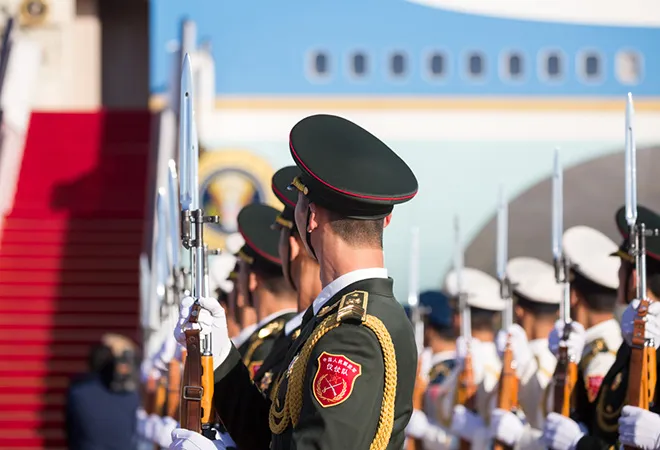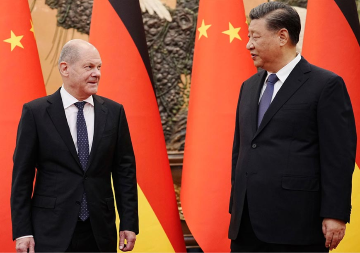Speaking for a numbing 3 hours and 23 minutes on Wednesday, China’s supreme leader Xi Jinping outlined a far-reaching and aspirational future for China which, he said, has entered a new era in “building socialism with Chinese characteristics” and is moving to occupy the global centre-stage on the basis of “composite national strength and international influence.”
This would involve a two-stage development plan. The first would run from 2020 to 2035, in which, building on the foundations of the moderately prosperous society that China had become, the Communist Party of China (CPC) would enhance the quality of life and work. The second, between 2035-2050, would see China develop into a “great modern socialist country that is prosperous, strong, democratic, culturally advanced, harmonious and beautiful.”
The word “democratic” here is not what we commonly understand by the term, but what Xi has termed “socialist democracy”, led by the CPC. Without the CPC in command, Xi asserted, national rejuvenation would be merely “wishful thinking.”
“Secure a Decisive Victory in Building a Moderately Prosperous Society in All Respects and Strive for the Great Success of Socialism with Chinese Characteristics for a New Era” was the wordy title of his work report on the inauguration of the 19th party congress.
The theme of the congress was that in achieving those goals, the CPC would “remain true to our original aspiration” and mission, which was to seek happiness for the Chinese people and rejuvenation for the Chinese nation.”
Five issues have stood out in the congress so far:
First, the nomenclature of XI Jinping’s “theoretical contribution” to the CPC has been disclosed, indicating his authority over the Chinese system. On the second day of the congress, three of Xi’s colleagues in the politburo standing committee praised “Xi Jinping Thought on Socialism with Chinese characteristics for a new era.”
Considering his predecessors’ political ideas were merely mentioned as “theories” and that, too, without their name, this is a major signal of Xi’s authority over the party and China and, it brings him on par with Mao and Deng Xiaoping. Another and more definitive signal could be his re-designation as “chairman”, which would enable him to bypass the informal two-term rule for general secretaries of the CPC.
People’s Daily Online listed 14 fundamental principles that the Xi Jinping Thought encapsulated:
- Ensuring party leadership over all work,
- Committing to a people centred approach,
- Continuing to comprehensively deepen reform,
- Adopting a new vision for development,
- Seeing that the people run the country,
- Ensuring every dimension of governance is law based,
- Upholding core socialist values
- Ensuring and improving living standards through development
- Ensuring harmony between human and nature
- Pursing a holistic approach to national security
- Upholding absolute party leadership over the people’s forces
- Upholding the principle of “one country, two systems” and promoting national unification
- Promoting the building of a community with a shared future for mankind
- Exercising full and rigorous governance over the party.
Second, Xi has essentially reiterated the basic premise of CPC rule in China — be loyal to the party and in turn, the party will transform your life. In line with this, Xi has outlined what the new thrust will be. To use Communist jargon, he said that the principal contradiction facing China now was the one “between unbalanced and inadequate development and the people’s ever growing needs for a better life.” Earlier, it was the one between “the ever growing material and cultural needs of the people and backward social production.” So the wealth was there, it needed better distribution and the people also wanted a better life which could mean anything from a better environment, leisure activities and education.
Third, even while asserting the pre-eminence of the CPC, Xi is aware of the many faults of the party’s style of governance and corruption. One major area is the weakness in the country’s legal system, which appears unfair and arbitrary to the people. In recent years, the CPC has promised to address this issue and in his work report, Xi has said that the CPC will set up a central leading group for advancing law-based governance in all areas to ensure strict law enforcement. It may be recalled that the entire 4th plenum of the 18th central committee had been devoted to discussing this issue in 2014.
In line with this, he has also promised to end the shuanggui system of secret arrest and interrogations of party personnel charged with misdemeanours will end and be replaced by a more transparent detention system. The anti-corruption campaign, however, will continue as “the party is determined to secure a sweeping victory over the greatest threat to the party.”
Fourth, by 2020, the first phase of reforms of the PLA will be over. In his work report, Xi said that by this period mechanisation will be achieved and the PLA would have made huge advances in the area of IT and strategic capabilities. By this time, the PLA would develop strong and efficient joint operations institutions for theatre commands and develop a command system “with Chinese characteristics.” The modernisation would be complete by 2035 and the PLA would become a world class military by 2050. “A military is built to fight” Xi said, echoing his many remarks calling on the PLA to become a force that can fight and win wars.
Fifth, according to Xi, China’s economy is transiting “from a phase of rapid growth to a stage of high-quality development.” But in a shift from the past, instead of privatising the state owned enterprises (SOEs) China will make them “stronger, better and bigger. “We will further reform of SOEs, develop mixed-ownership economic entities, and turn Chinese enterprises into world-class, globally competitive firms.”
But at the same time he declared that China would significantly ease market access and open the service sectors further. “We will implement the system of pre-establishment national treatment plus a negative list across the board,” declaring that all businesses registered in China will be treated equally.
This commentary originally appeared in The Wire.
The views expressed above belong to the author(s). ORF research and analyses now available on Telegram! Click here to access our curated content — blogs, longforms and interviews.




 PREV
PREV


